- Research
- Research Centers
- Journals
- Admission
- Introduction
- Programs
- Application
- Alumni & Giving
- Alumni Club
- Giving
The 2022 International Symposium on African Languages and Culture Research was held Nov 12 at Beijing Foreign Studies University (BFSU).
Those in attendance of the opening ceremony of the symposium included Sun Youzhong, chairman of the Advisory Committee of Foreign Language and Literature Teaching in Higher Education under the Ministry of Education (MOE), member of the standing committee of the CPC BFSU committee and vice-president of the university; Xiao Han, Chinese ambassador to Senegal; Zhong Zhixiang, a member of the Foreign Language Discipline Evaluation Group of the State Council; and Wu Jiewei, secretary-general of the Less Commonly Taught Languages Branch of the MOE Advisory Committee of Foreign Language and Literature Teaching in Higher Education.
The opening ceremony was chaired by Li Hongfeng, dean of the School of African Studies.
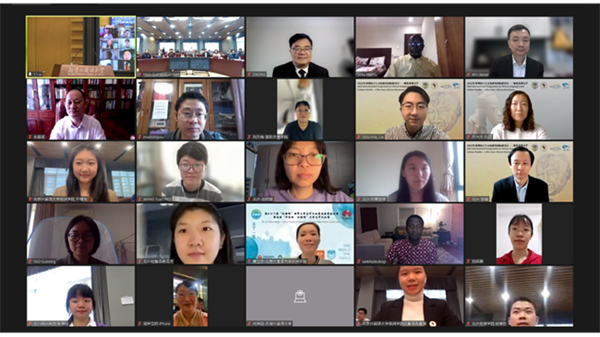
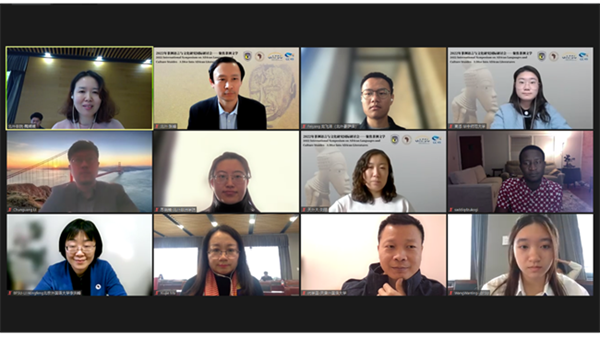
Experts and scholars from renowned foreign and domestic universities give speeches at the symposium. [Photo/bfsu.edu.cn]
Experts and scholars from universities in countries such as South Africa, Nigeria, Botswana, the United States and more than 20 domestic universities, including Peking University, the Chinese Academy of Social Sciences, Beijing Normal University and BFSU, gave speeches at the meeting.
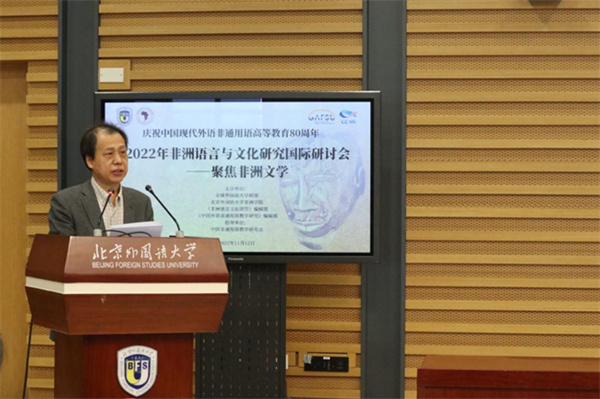
Sun Youzhong, chairman of the Advisory Committee of Foreign Language and Literature Teaching in Higher Education under the MOE, member of the standing committee of the CPC BFSU committee and vice-president of the university, addresses the opening ceremony of the symposium. [Photo/bfsu.edu.cn]
Sun stressed in his speech that BFSU has pursued development through talent training, academic studies and global exchanges and has striven to play a greater role in the mutual learning of world civilizations, the construction of a community with a shared future for mankind and the in-depth development of China-Africa cooperation, utilizing its advantages in global languages, culture and governance.
He encouraged scholars, especially young teachers and students, to present the real image of China and Africa through literature research, and jointly promote peaceful world development.
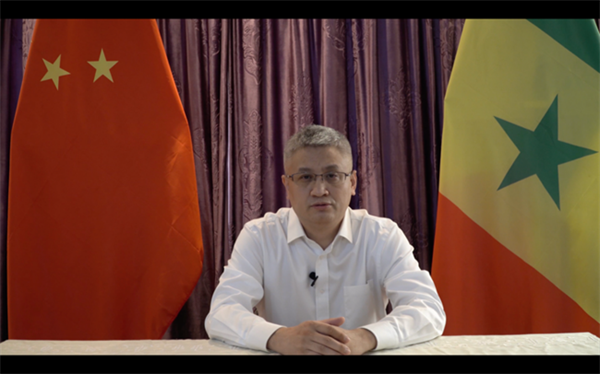
Xiao Han, Chinese ambassador to Senegal, addresses the opening ceremony of the symposium. [Photo/bfsu.edu.cn]
Xiao noted that the School of African Studies at BFSU has cultivated “civil ambassadors” who are familiar with African languages and culture, and has established the Forum on China-Africa Cooperation and fostered the spirit of China-Africa friendship and cooperation with practical actions.
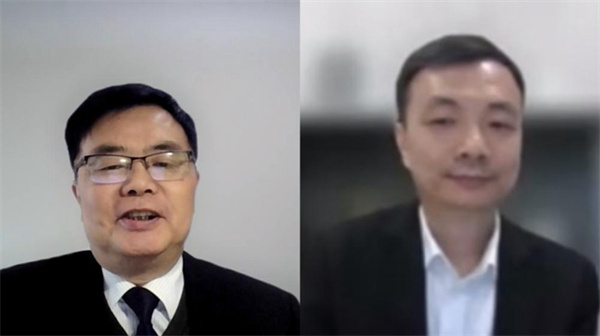
Zhong Zhixiang, a member of the Foreign Language Discipline Evaluation Group of the State Council, and Wu Jiewei, secretary-general of the Less Commonly Taught Languages Branch of the MOE Advisory Committee of Foreign Language and Literature Teaching in Higher Education, address the opening ceremony of the symposium. [Photo/bfsu.edu.cn]
Zhong praised the achievements and contribution made by BFSU in teaching and conducting research on less commonly taught languages in China, adding that he hopes that the School of African Studies at the university will further help in the development of the field.
Wu congratulated BFSU on the holding of the symposium and shared his ideas on less commonly taught language teaching and cultural exchanges.
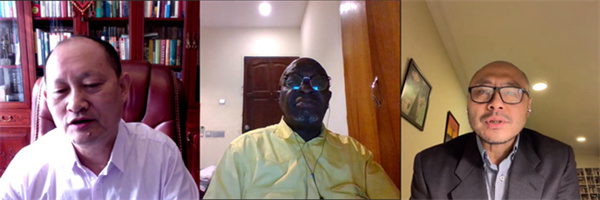
Three scholars give keynote speeches on African literature at the symposium. [Photo/bfsu.edu.cn]
Zhu Zhenwu, director of the Foreign Literature Research Center at Shanghai Normal University, gave a keynote speech titled “The African Features of African Literature and the Construction of African Literary Studies in China”.
Zhu said that he believes African literature is a mirror that reflects the historical and cultural origins of African countries and their current and future trajectory. Studying African literature is of far-reaching significance for understanding the politics, history and culture of African countries, he added.
Zhu called on African literature researchers in China to actively conduct field research, dig deep, take Chinese literature and culture as the starting point and world literature and culture as reference to carry out transcultural, interdisciplinary, cross-spatial and cross-visual theoretical thinking and build the discipline of African literature studies in China.
Professor Olagoke Alamu from Ekiti State University delivered a report titled “Role Changes of African Literature from a Historical Perspective”, in which he analyzed the characteristics and changes of African literature before and after the colonial era.
According to his report, Alamu believes that modern African literature has been especially influenced by the literary systems of suzerain countries and has also been nourished by African oral tradition.
Jiang Hui, deputy research fellow at the University of Electronic Science and Technology of China, gave a keynote report titled “Seeking Truth in Time: Possible Concepts of African Literary History”.
Jiang began with a series of enlightening issues, gave his insight into the relationship between history and literature, questioned the hegemonic paradigm of post-colonial studies, and called for reflection on time structure as the essence of literary history and redefinition of African literary history.
Participating scholars shared and exchanged academic views at the two sub-forums on “African Literature: Theory and Innovation” and “African Literature: History and Reality”.
They discussed the writing techniques and creative ideas of representative African writers, native African languages and literature from the historical perspective, English literature in Africa in the colonial context, the influence of French and Portuguese literature and their translation and introduction of African literary traditions, and feminism in Africa.
Among the discussed topics, Tswana literature, Xhosa literature and Somali literature were first introduced to the African literature research field in China.
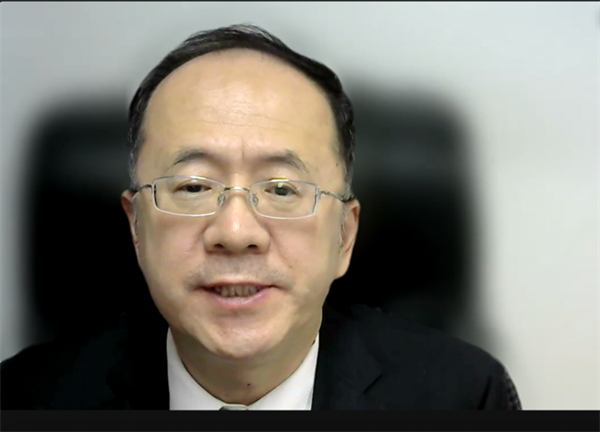
Jia Wenjian, deputy Party secretary and vice-president of the university, gives a closing speech at the symposium. [Photo/bfsu.edu.cn]
Jia Wenjian, deputy Party secretary and vice-president of the university, said in his closing speech that the advancement of African literature shows that Africa has gradually grasped historical initiative in its development.
BFSU will spare no effort to promote China-Africa friendship and contribute to the building of a community with a shared future for mankind, he added.
The closing ceremony of the symposium was presided over by Xu Ye, secretary of the general Party branch of the School of Asian Studies and the School of African Studies at BFSU.
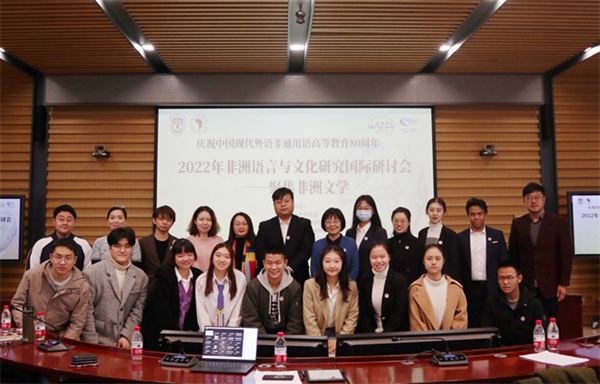
Attendees of the 2022 International Symposium on African Languages and Culture Research gather for a group photo. [Photo/bfsu.edu.cn]
Jointly hosted by the Global Alliance of Foreign Studies Universities and the School of African Studies at BFSU, the symposium was among a series of activities organized to celebrate the 80th anniversary of conducting higher education on less commonly taught foreign languages in China.
Since 2020, the school has held the symposium for three consecutive years and has received responses and support from scholars at home and abroad, effectively promoting exchanges and cooperation in the academic community.